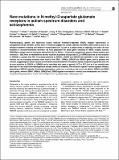Rare Mutations in N-methyl-D-aspartate Glutamate Receptors in Autism Spectrum Disorders and Schizophrenia

View/
Author
Tarabeux, J
Kebir, O
Hamdan, F F
Piton, A
Henrion, É
Millet, B
Fathalli, F
Joober, R
Rapoport, J L
Fombonne, É
Mottron, L
Forget-Dubois, N
Boivin, M
Michaud, J L
Drapeau, P
Lafrenière, R G
Rouleau, G A
Krebs, M-O
Gauthier, J.
Xiong, L.
Spiegelman, D.
Note: Order does not necessarily reflect citation order of authors.
Published Version
https://doi.org/10.1038/tp.2011.52Metadata
Show full item recordCitation
Tarabeux, J., O. Kebir, J. Gauthier, F. F. Hamdan, L. Xiong, A. Piton, D. Spiegelman, et al. 2011. Rare mutations in n-methyl-d-aspartate glutamate receptors in autism spectrum disorders and schizophrenia. Translational Psychiatry 1(11): e55.Abstract
Pharmacological, genetic and expression studies implicate N-methyl-D-aspartate (NMDA) receptor hypofunction in schizophrenia (SCZ). Similarly, several lines of evidence suggest that autism spectrum disorders (ASD) could be due to an imbalance between excitatory and inhibitory neurotransmission. As part of a project aimed at exploring rare and/or de novo mutations in neurodevelopmental disorders, we have sequenced the seven genes encoding for NMDA receptor subunits (NMDARs) in a large cohort of individuals affected with SCZ or ASD (n=429 and 428, respectively), parents of these subjects and controls (n=568). Here, we identified two de novo mutations in patients with sporadic SCZ in GRIN2A and one de novo mutation in GRIN2B in a patient with ASD. Truncating mutations in GRIN2C, GRIN3A and GRIN3B were identified in both subjects and controls, but no truncating mutations were found in the GRIN1, GRIN2A, GRIN2B and GRIN2D genes, both in patients and controls, suggesting that these subunits are critical for neurodevelopment. The present results support the hypothesis that rare de novo mutations in GRIN2A or GRIN2B can be associated with cases of sporadic SCZ or ASD, just as it has recently been described for the related neurodevelopmental disease intellectual disability. The influence of genetic variants appears different, depending on NMDAR subunits. Functional compensation could occur to counteract the loss of one allele in GRIN2C and GRIN3 family genes, whereas GRIN1, GRIN2A, GRIN2B and GRIN2D appear instrumental to normal brain development and function.Other Sources
http://www.ncbi.nlm.nih.gov/pmc/articles/PMC3309470/pdf/Terms of Use
This article is made available under the terms and conditions applicable to Other Posted Material, as set forth at http://nrs.harvard.edu/urn-3:HUL.InstRepos:dash.current.terms-of-use#LAACitable link to this page
http://nrs.harvard.edu/urn-3:HUL.InstRepos:10340523
Collections
- HMS Scholarly Articles [17922]
Contact administrator regarding this item (to report mistakes or request changes)


